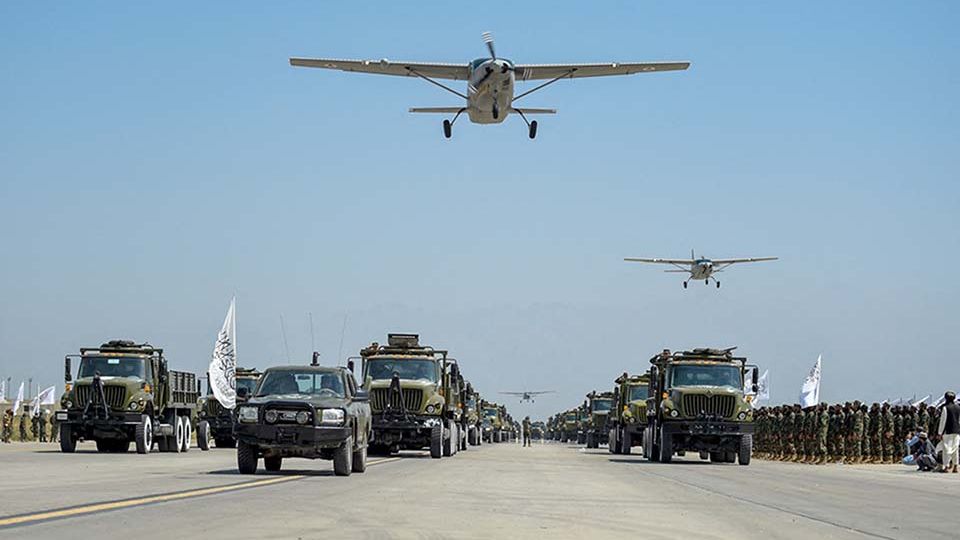September 25, 2025
ISLAMABAD – US PRESIDENT Donald Trump now wants Bagram airfield in Afghanistan to be returned to American control. He has threatened the Afghan Taliban rulers with “bad things” if they do not hand over the former US airbase. He might not have specifically talked about using military force, but has not ruled out the option either. “You’re going to find out what I’m going to do,” he told a reporter when asked whether he would consider sending troops. How seriously should the world take Trump’s latest threat of acquiring a foreign territory?
It’s not the first time the maverick leader has brandished such a wild threat. Previously, he had threatened to take over the Panama Canal and Greenland. He is now focused on regaining control of the former US airbase, as he reiterated at a press conference alongside the British prime minister in London recently.
Although Trump has been discussing renewed American control of Bagram since his return to the White House, his statement at the press conference was more specific. The American president spoke about a possible diplomatic approach in order to reach an agreement with the Taliban administration. “We’re trying to get it back because they need things from us,” he was quoted as saying.
Trump repeatedly cited the base’s proximity to China’s nuclear facilities as a reason to control the key airfield. “It’s an hour away from where China makes its nuclear weapons,” Trump said in his comments during the press conference. Trump has also said that China has established a presence at the base, located 40 kilometres north of Kabul.
Bagram was built by the former USSR in the 1950s but was later vastly improved and expanded by the US military. For decades, the base symbolised not only the struggle for Afghanistan but also the wider contest for influence in one of the world’s most volatile crossroads — where South Asia, Central Asia and the Middle East converge.
It once served as the headquarters of the US occupation forces and their allies. The airbase, which accommodated 10,000 troops at a time, was vacated after the chaotic American exit from Afghanistan in 2021 that also ended the two-decade war. It was the worst humiliation suffered by the world’s most powerful military as the Taliban returned to power.
Interestingly, the withdrawal of American forces from Bagram and the rest of Afghanistan came following the Doha Agreement, which was signed in February 2020 under Trump’s first presidency. But he has repeatedly blamed the Biden administration for abandoning the airbase. His threats of reoccupying the base, potentially renewing the American presence in Afghanistan, became more pronounced after a strong rejection by the Kabul administration of any possible deal ceding control of Afghan territory.
An Afghan Taliban official denied that any negotiations were going on with Washington on the issue. The statement said it had been “consistently communicated to the United States in all bilateral negotiations that, for the Islamic Emirate, Afghanistan’s independence and territorial integrity are of the utmost importance”. The statement also reminded stakeholders that, under the Doha Agreement, the US had pledged that “it will not use or threaten force against the territorial integrity or political independence of Afghanistan, nor interfere in its internal affairs”. It advised Washington to abide by its commitment.
Apparently, the strongly worded statement by the Kabul regime was too much for Trump’s ego. Not surprisingly, his tone has become more threatening towards the Kabul regime. It remains to be seen what option the Trump administration will deploy after the Taliban’s firm rejection of any deal on Bagram. Any use of force would certainly end up in another invasion of Afghanistan, which would have serious consequences not only for the region but also for global peace. It would draw in all the regional powers, especially China.
Responding to Trump’s comments, a Chinese foreign affairs ministry official said that China respects Afghanistan’s independence, sovereignty and territorial integrity. “Afghanistan’s future should be decided by its own people,” the official said, adding: “Stirring up tension and creating confrontation in the region won’t be popular.”
Although China has not formally recognised the Taliban regime, it is among the five countries that have upgraded their diplomatic ties with the interim administration to full ambassadorial status. Beijing is also the largest investor in Afghanistan, primarily in the mining and infrastructure sectors. There are negotiations going on to extend CPEC to Afghanistan. Any military misadventure by the Trump administration in Afghanistan could also pull Russia into the conflict. Russia is the only country that has formally recognised the Taliban regime.
Pakistan would be directly affected by any American military intervention in Afghanistan, with which it has a 2,500-kilometre-long border. As a front-line state in two previous wars in Afghanistan involving superpowers, which had cost this country massively, it’s still reeling from the effects. Pakistan needs to be extremely cautious of any possible American misadventure.
Over the last few months, we have seen Trump re-embracing Pakistan, showing interest not only in investing in mining but also in strengthening security cooperation with Islamabad. One cannot be sure about Trump’s next move, given his unpredictability and the absence of any institutional policymaking process. One is not sure what kind of expectations he has from Pakistan. These are valid concerns.
It’s true that Pakistan has serious problems with the Taliban regime’s refusal to take action against the militant groups operating from their sanctuaries in Afghanistan. These groups are also believed to have active support from some Afghan commanders, and Pakistan faces a serious security challenge. But any outside military intervention in Afghanistan would also threaten Pakistan’s national security.
Trump must also learn some lessons from America’s military failure in Afghanistan. One can only hope that Trump’s latest threat of retaking Bagram airbase is as hollow as the one to take over the Panama Canal and Greenland.
The writer is an author and journalist.


